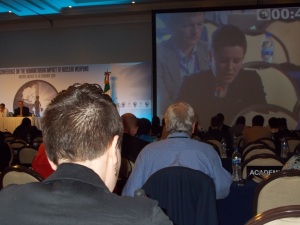February 14, 2014
[Ray Acheson of WILPF's Reaching Critical Will project and a member of ICAN's International Steering Group, read the following statement during the closing session of the Second Conference on the Humanitarian Impact of Nuclear Weapons in Nayarit, Mexico.]
 Ray Acheson speaks on behalf of ICAN
Ray Acheson speaks on behalf of ICANI am speaking on behalf of the International Campaign to Abolish Nuclear Weapons, a coalition of over 350 organisations in 90 countries.
We have been given over the past two days a chilling reminder of what nuclear weapons are, and what they do.
They do not bring security. They bring death and destruction on a scale that cannot be justified for any reason.
The claim by some states that they continue to need these weapons to deter their adversaries has been exposed by the evidence presented at this conference and in Oslo as a reckless and unsanctionable gamble with our future.
The immediate effects of even a single nuclear weapon detonation are shocking and overwhelming. Its destructive force will cause nightmarish scenes of death and despair.
One detonation will cause tens of thousands of casualties and inflict immediate and irreversible damage to infrastructure, industry, livelihoods, and human lives. The effects will persist over time, devastating human health, the environment, and our economies for years to come. These impacts will wreak havoc with food production and displace entire populations.
As we have heard here from scientists and physicians, the use of less than one percent of existing arsenals against cities would have extreme and long lasting consequences for the Earth’s climate and for agriculture. This would put billions of lives in jeopardy.
The existence of nuclear weapons generates great risk. There have been numerous instances where the incidence of an accidental nuclear detonation has hung on a razor’s edge. And we have recently heard a number of reports of the declining operational atmosphere and disturbing behaviour of those in supposed “command and control” of these arsenals.
Such accidents are only made possible, however, because the military doctrines of the nuclear-armed states and some of their allies require preparations for the deliberate use of nuclear weapons – in many cases within minutes of an order being given. The risk of conflict between states possessing nuclear weapons is a direct consequence of possession and of nuclear deterrence relationships.
While nuclear weapons have not been used in acts of war since the United States dropped two bombs on Hiroshima and Nagasaki in 1945, they have nevertheless created health and environmental catastrophes around the world. Testing in the Pacific, Kazakhstan, the United States, Africa, South Asia, and China has caused profound damage to the environment and human health.
Nuclear weapons also undermine development and the achievement of global economic and social equality. The maintenance and modernisation of nuclear weapons diverts vast and essential resources needed to address real human needs, including the Millennium Development Goals.
Despite all this evidence about the horror, instability, and injustice generated by nuclear weapons, some insist that we will not see their elimination in our lifetime. That depends on whether we are willing to accept the risk we live with today. Unless we act, nuclear weapons will be used, either by accident, design, or miscalculation. The only questions are when, where, and how many.
Unlike the other weapons of mass destruction – chemical and biological weapons – nuclear weapons are not yet subject to an explicit legal prohibition. Now is the time to address this anomaly, which has been allowed to persist for far too long.
Those countries that have renounced nuclear weapons—the overwhelming majority—have made the right decision for the security of their countries and their populations and for the survival of life on Earth. Those same countries have the opportunity now to advance not only the humanitarian agenda but also our human future by negotiating a treaty banning nuclear weapons.
We would welcome the participation of the nuclear-armed states. But most of them have demonstrated their unwillingness to constructively engage let alone lead in such a process.
History shows that legal prohibitions of weapon systems—their possession as well as their use—facilitate their elimination. Weapons that have been outlawed increasingly become seen as illegitimate. They lose their political status and, along with it, the money and resources for their production, modernisation, proliferation, and perpetuation.
For us, the announcement of the next meeting in Vienna indicates a willingness amongst governments to move from a discussion about the humanitarian impacts of nuclear weapons to a discussion about what must be done to make sure they can never be used again.
Ridding the world of nuclear weapons will take courage. It will take leadership by states free of nuclear weapons. Show that leadership and you will have the support of civil society. It is time. It is time to change the status quo. It is time we ban nuclear weapons.